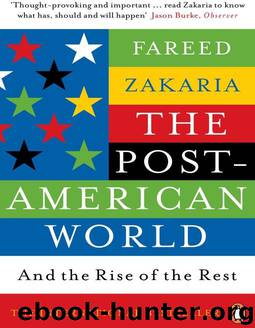The Post-American World by Fareed Zakaria

Author:Fareed Zakaria
Language: eng
Format: mobi, epub
Tags: Politics
ISBN: 9780743576857
Publisher: W. W. Norton & Company
Published: 2008-01-02T00:00:00+00:00
Blind and Toothless
After winning its independence, India was eager to play a large role on the world stage. This ambition was inherited from Britain, which ran a great deal of its empire from New Delhi. It was from India that Britain administered Iraq in the decades after the First World War. It was Indian soldiers who carried out Britain’s imperial crusades in the Middle East and elsewhere. The India Office was a critical center of world power, the most important extension of the British Empire, and Indians watched and learned the great-power game from the superpower of the age.
India’s first prime minister, Nehru, was comfortable in that tradition. He had been educated like an English gentleman, at Harrow and Cambridge, traveled and read widely, and written extensively about world affairs. His grasp of history was extraordinary. During one of many spells in the prisons of British India, this time from 1930 to 1933, he wrote a series of letters to his daughter that outlined the entire sweep of human history, from 6000 b.c. to the present day, detailing the rise and fall of empires, explaining wars and revolutions, and profiling kings and democrats—all without any access to a library. In 1934, the letters were collected and released as a book, Glimpses of World History, to international acclaim. The New York Times described it as “one of the most remarkable books ever published.”
Not surprisingly, Nehru became the towering figure in Indian foreign policy. For his entire tenure as prime minister, from 1947 to 1964, he was his own foreign minister. One of India’s first foreign secretaries,* K. P. S. Menon, explains in his autobiography, “We had no precedents to fall back upon, because India had no foreign policy of her own until she became independent. We did not even have a section for historical research until I created one. . . . Our policy therefore necessarily rested on the intuition of one man, who was Foreign Minister, Jawaharlal Nehru.” This meant that India’s early foreign policy was driven by Nehru’s principles and prejudices, which were distinctive. Nehru was an idealist, even a moralist. He was for nonalignment and against the Cold War. His mentor, Mahatma Gandhi, was an unyielding pacifist. “An eye for an eye, a tooth for a tooth,” Gandhi used to say, “and soon the world will be blind and toothless.” The mahatma was revered in India almost like a god, and his strategy of nonviolence had brought down an empire. Like many of his followers, Nehru was determined to chart a new course in international affairs that lived up to those ideals.
Nehru rooted India’s foreign policy in abstract ideas rather than a strategic conception of national interests. He disdained alliances, pacts, and treaties, seeing them as part of the old rules of realpolitik, and was uninterested in military matters. He asked his friend Lord Mountbatten, the last British viceroy (who briefly served as India’s first head of state), to organize the defense bureaucracy and intervened only to resist
Download
This site does not store any files on its server. We only index and link to content provided by other sites. Please contact the content providers to delete copyright contents if any and email us, we'll remove relevant links or contents immediately.
| Arms Control | Diplomacy |
| Security | Trades & Tariffs |
| Treaties | African |
| Asian | Australian & Oceanian |
| Canadian | Caribbean & Latin American |
| European | Middle Eastern |
| Russian & Former Soviet Union |
The Secret History by Donna Tartt(16657)
The Social Justice Warrior Handbook by Lisa De Pasquale(11493)
Thirteen Reasons Why by Jay Asher(7801)
This Is How You Lose Her by Junot Diaz(5797)
Weapons of Math Destruction by Cathy O'Neil(5046)
Zero to One by Peter Thiel(4834)
The Myth of the Strong Leader by Archie Brown(4795)
Promise Me, Dad by Joe Biden(4455)
Beartown by Fredrik Backman(4433)
Stone's Rules by Roger Stone(4422)
How Democracies Die by Steven Levitsky & Daniel Ziblatt(4413)
The Fire Next Time by James Baldwin(4350)
100 Deadly Skills by Clint Emerson(4085)
A Higher Loyalty: Truth, Lies, and Leadership by James Comey(4038)
Rise and Kill First by Ronen Bergman(4020)
The David Icke Guide to the Global Conspiracy (and how to end it) by David Icke(3891)
The Farm by Tom Rob Smith(3878)
Secrecy World by Jake Bernstein(3788)
The Doomsday Machine by Daniel Ellsberg(3737)
